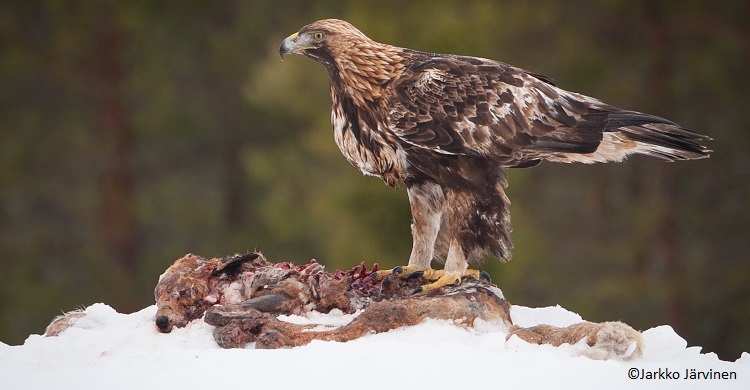2nd Meeting of the CMS Preventing Poisoning Working Group (PPWG2)

Photo credit: Golden eagle (Aquila chrysaetos) by Jarkko Järvinen - Flickr, CC BY-SA 2.0Poisoning is a significant global problem affecting a wide range of migratory bird species across almost all habitats. Birds may be exposed to multiple sources of poisoning in their ranges causing lethal and sub-lethal effects. These impacts include poisoning from:
- Insecticides
- Rodenticides
- Poison-baits
- Veterinary drugs, including diclofenac
- Lead ammunition and fishing weights
Considering the high number of migratory birds being killed annually as a result of poisoning, and that this mortality severely affects the conservation status of vulnerable species, the 11th Meeting of the Conference of the Parties to CMS (COP11) passed Resolution 11.15 - Preventing Poisoning of Migratory Birds, recalling CMS COP10 Resolution 10.26 - Minimizing the Risk of Poisoning to Migratory Birds. Based on the latter one, the Preventing Poisoning Working Group has been established under the umbrella of the Scientific Council. As an outcome of its 1st Meeting of the Working Group in Tunis, Tunisia 27 and 28 May 2013, the Working Group developed Guidelines to Prevent the Risk of Poisoning to Migratory Birds, which have been adopted by CMS COP11 in 2014. The Guidelines provide key recommendations to countries in order to effectively monitor, prevent and eliminate sources of poisoning of migratory birds by implementation into national policies. One concrete elaboration in this respect was achieved by the development of an Implementation Plan for Southern African Countries as the outcome of the Sub-Regional Workshop on Preventing Poisoning on Migratory Birds held on 24 August 2015 in Cape Town, South Africa.
The 2nd Meeting of the Preventing Poisoning Working Group will take place from 20 to 21 February 2017 in Toldeo, Spain, at the kind invitation of the Regional Government of Castilla-La Mancha. At this meeting, the Working Group aims to:
- review the process of countries in the implementation of the Guidelines,
- assess the current impact of poisoning and existing implementation gaps,
- develop and adjust suitable responses to address bird poisoning,
- specifically discuss the issue of lead ammunition and further approaches in this respect,
- agree on the content of a follow up Resolution or Decision on bird poisoning to be submitted to CMS COP12 in October 2017
The meeting will take place back to back with the Overarching Workshop to develop a Multi-species Action Plan to Conserve African-Eurasian Vultures (Vulture MsAP), that will take place from 16 to 18 February 2017, also in Toledo. A field trip available to delegates of both events on 19 February 2017 will give the opportunity for on-site discussions on cross-cutting and potential synergies.
The organization of this event has been made possible thanks to generous voluntary financial and in-kind contributions provided by the Regional Government of Castilla-La Mancha in Spain, with additional organisational support received from the Spanish Ornithological Society (SEO/BirdLife), the BirdLife International partner organization in Spain.
For more information on the Overarching Workshop to develop a Multi-Species Action Plan to Conserve African-Eurasian Vultures (Vulture MsAP), please follow this link:
| Dates | 20 Feb 2017 to 21 Feb 2017 |
|---|---|
| Organizador | UNEP/CMS Secretariat |
| Instrumento de la CMS | CMS |
| Tipo | Working group |
| Tipo | Official |
| Status | Concluded |
| Idiomas | English |
| Pais | Spain |
| Ciudad | Toledo |
| Lugar | Toledo |
Descargue todos los archivos en .zip
| Número | Título | Archivos |
|---|---|---|
| UNEP/CMS/PPWG2/Doc.1 | Provisonal Agenda | |
| UNEP/CMS/PPWG2/Doc.1a | Annotated Agenda and Meeting Schedule | |
| UNEP/CMS/PPWG2/Doc.2 | Questionnaire Report | |
| UNEP/CMS/PPWG2/Doc.3 | Programme of Work Template | |
| UNEP/CMS/PPWG2/Doc.4 | Draft Terms of Reference of the Lead Task Force | |
| UNEP/CMS/PPWG2/Doc.5 | Illegal Take including Hunting, Trapping and Poisoning | |
| UNEP/CMS/PPWG2/Doc.6 | Unintentional and Intentional Poisoning or Harassment of Cranes related to Agriculture | |
| UNEP/CMS/PPWG2/Doc.7 | BirdLife Report on Poisoning-Specific Analysis on Data of Illegal Killing of Birds | |
| UNEP/CMS/PPWG2/Doc.8 | Programme of Work Draft Comments |
| Número | Título | Archivos |
|---|---|---|
| Fact Sheet for Participants |



